Overview
16th Biennial Symposium on Violence & Aggression
May 15-17, 2016
University of Saskatchewan
Saskatoon, SK
The Biennial Symposium on Violence & Aggression has been a collaborative effort of the Regional Psychiatric Centre, Correctional Service Canada, and the University of Saskatchewan since 1986. Targeted to front-line workers, as well as clinicians and other professionals and administrators in criminal justice and forensic mental health, the Symposium translates research and theory into practice and provides an opportunity to highlight excellence and innovation within a variety of correctional and criminal justice environments.

General Information
Featured Speakers:
Robert D. Hare, Ph.D., University of British Columbia, on Adult Psychopathy
Sgt. (Ret.) Ernie Louttit, Author, on Lighting Up Violence
Roberta Sinclair, Ph.D., Royal Canadian Mounted Police, on Child Exploitation
Henry J. Steadman, Ph.D., President of Policy Research Associates, on Mental Health
and many more ...
All Symposium sessions will take place on the University of Saskatchewan campus.
Welcome and Reception
An Opening Reception will take place the evening of May 15, 2016, on the second floor of Marquis Hall.
Accommodations
Symposium delegates are expected to arrange their own accommodations.
Park Town Hotel - A limited number of rooms is reserved for Symposium delegates. Request the university rate when booking a room. Contact the Park Town at 1-306-244-5564 or online at http://www.parktownhotel.com. A complimentary shuttle to/from the University campus is available for hotel guests on Monday and Tuesday. Enquire at the front desk at check-in for information.
Refresh Inn and Suites - Please mention the CFBSJS V&A Symposium when booking a room. Contact Refresh Inn at 1-855-493-7374 or online at http://www.refreshinnandsuites.com/. There is a limited number of rooms and they will only be held until March 2, 2016.
University of Saskatchewan - Some rooms will be made available for symposium delegates in Voyageur Place Residence, Voyageur Place Suites, and College Quarter. It is recommended that these accommodations be booked more than 30 days prior to arrival. University of Saskatchewan Conference Accommodations.
Symposium delegates are encouraged to book accommodations early.
Parking
All pay parking lots and meters on campus are $2.00 per hour for 2015/16.
Rates may increase on May 1, 2016.
Summer parking is from May 1 to August 31.
On Sunday evening, May 15, patrons can park in F lot, located by the Education building, at no cost.
Lot 1, located across from Place Riel, has no daily maximum.
Lot 4, located by the Education Building, has a daily maximum of $5.00 per exit.
Stadium Parkade has a daily maximum of $5.00 per exit.
Agriculture Parkade has a daily maximum of $6.00 per exit.
G lot, located on Science Crescent, is reserved Monday to Friday for staff and faculty parking until 5 pm. After 5 pm, patrons can use G lot for $4.00 per day per exit.
All meters at Royal University Hospital locations are in operation 24 hours (year round).
Abstracts and Presentations
The past 20 years have seen a rapid expansion of mental health courts throughout North America. Like many policy developments and clinical practices, they proliferated in the absence of empirical data about whether they work. Over the past few years more data on client outcomes has become available. These results have been quite consistent in showing reduced numbers of subsequent new arrests and a reduction in jail days for enrollees who graduate. Despite these results, questions can be raised as to whether these courts deflect communities from making other changes in their responses to justice-involved persons with behavioral health disorders that could have much greater impact. The rationale for this possibility will be explored along with other options.
Internet Child Exploitation (ICE) investigators from the Saskatchewan ICE Unit will explain their role in protecting children from the dangers of the Internet by showcasing some of the methods and efforts they use to identify child sexual predators and hold them accountable for their criminal behavior. This presentation will outline how the ICE Unit is set up, their mandate and focus, the scope of the problem, and what is being done to address this type of criminal behavior. The presentation will include a case study of a local offender from the start of the investigation to conviction.
The Alberta NCR Project has sought to describe the demographics the complete population of those found to be Not Criminally Responsible/Insane in Alberta’s history. This presentation will describe the Alberta NCR population, provide data as to population-based recidivism, discuss the impact of the Winko and Swain decisions on the NCR population in Alberta, discuss risk assessment/ management issues with those with Major Mental Illness, and discuss proposed future directions with the NCR population.
Speaker: Dr. Andrew Haag, Forensic Psychologist, Alberta Health Services, Clinical Lecturer, Department of Psychiatry, University of Alberta, Sessional Lecturer, Department of Psychology, University of Alberta
Successful mental health engagement with Indigenous peoples remains a challenge. Dr. Holly Graham will discuss some of the clinical issues related to efficacy and cultural clashes that may impact the counseling process. Holly views her practice through a trauma-informed lens, one that is holistic and grounded in the teachings of the medicine wheel with an emphasis on the physical, emotional, intellectual, and spiritual aspects of the human condition. In addition, she utilizes Eye Movement Desensitization and Reprocessing (EMDR), Eye Movement Integration (EMI) and Somatic Experiencing (SE) therapies. Case examples will be discussed.
Speaker: Holly Graham, Ph.D., R.D. Psychologist (Provisional), Assistant Professor, College of Nursing, University of Saskatchewan
This presentation will briefly outline CSC's refined model of mental health care and collateral initiatives that support a full continuum of service delivery to offenders with mental health concerns. Key supporting activities, as outlined in the Mental Health Action Plan for Federal Offenders, include timely assessment, effective management, sound intervention, ongoing training and development, and robust governance and oversight. In describing various initiatives in place, the speaker will focus on the intersection of violence and mental illness, including current challenges and strategies to mitigate violence and address the mental health needs of offenders.
While the nature of our work makes it practically impossible to prevent violence it is possible to reduce it. This presentation will include some practical methods and strategies for reducing the cumulative effects of long term exposure to violence for front line workers. Organizational culture and leadership will also be examined with observations based on my experiences on how we can do better when dealing with violence. Lastly, because it is so caustic the negative return on trying to defend yourself from allegations of racism while doing your job will be discussed with strategies on how to deal with it.
Speaker: Sergeant (Ret.) Ernie Louttit, Author
The audience will learn about the challenges faced by the consent rationale for entry into a mental health court process and will be invited to consider whether MHCs are coercive in nature and whether there might be better alternative rationales for entry into an MHC stream. The audience will be asked to contrast the dichotomy and the uncertainty of determining consent and the possibility of utilizing advance directives in the MHCs. The audience will be introduced to the inadequacy of the legislative mandate for MHC processes and will be asked to consider whether legislative change is necessary and what that legislation might say.
Speakers: Glen Luther, LLM, LLB, & Dr. Mansfield Mela, University of Saskatchewan
Some of the highest risk violent and sexual offenders are supervised in the community under recognizance orders issued under the auspices of Section 810 of the Criminal Code of Canada. This presentation focuses on how an Edmonton forensic mental health clinic, police, and other community organizations are collaborating to coordinate risk management with this high-risk population of offenders. Target population demographics will be described, along with practical skills for working together and with the offenders. Supervision, treatment, and responsivity principles are combined toward maximizing success for the offenders in the community.
Speaker: Dr. Debra Jellicoe, Clinical Forensic Psychologist, Forensic Assessment and Community Services, Alberta Health Services & Detective Chris Hayduk, Edmonton Police Service
The Internet has altered the way child sexual exploitation offenses (for example, child pornography, luring) are committed, investigated, and prosecuted. This medium provides access to electronically produced child sexual abuse images/videos, provides virtual meeting places for those who engage in the sexual exploitation of children, and can facilitate child luring. These aspects have significant effects on response strategies. Topics included: 1) an overview of Canadian government/law enforcement responses; 2) discussion of unique needs of victims/survivors; 3) the psychological health and wellness of specialists; and, 4) international awareness initiatives. Collaboration across law enforcement, academia, victim advocates, and other specialists is critical.
Speaker: Dr. Roberta Sinclair, Manager, Research & Development, RCMP, Canadian Police Centre for Missing and Exploited Children, Behavioural Science Branch
Canada’s Correctional Investigator has identified mental health disorders, alone or in combination with alcohol abuse or drug addiction, as a “major health care and public safety challenge” (Sapers, 2014). It is well-established that trauma is a key contributor to both among Canada’s federal prisoner population. There is also growing attention to the potential for therapy dogs to assist with the support needs of individuals with mental health, addiction, and trauma concerns. Animal Assisted Interventions (AAIs) are “any intervention that intentionally includes or incorporates animals as part of a therapeutic or ameliorative process or milieu” (Kruger and Serpell, 2006), and are variously offered in Correctional Service Canada institutions. This presentation raises awareness about the potential benefits of AAIs on both practice and policy levels by reflecting on the work of St. John Ambulance therapy dogs with prisoners at a federal Saskatchewan corrections facility. Particular attention will be paid to the dog’s ability to support a trauma-informed approach to prisoner wellness. Illustrations from the visits will be shared.
Speaker: Colleen Dell, Ph.D., Research Chair in Substance Abuse, Department of Sociology, University of Saskatchewan
Honor-based violence is a reality in Western countries. The catalyst for public awareness was the quadruple honor killing in Kingston, Ontario. Indicators, distinctive features of patriarchal beliefs, and a lack of understanding by service providers were present months prior to these murders. This raised concerns about the effectiveness of service providers to protect those most vulnerable. The United Nations estimates that 5,000 individuals worldwide are murdered in the name of honor each year. These honor crimes occur in many countries, predominately in South Asia and the Middle East, but are not limited to a certain culture or religion. A rise in immigration from these areas has Canada and other western countries confronting the appearance of honor-based violence.
The Regina Police Service has taken steps to ensure that all members acquire knowledge about and education on honor-based violence. Members acquire an understanding of patriarchal societies and their power structure, are educated on the components of honor-based violence, including forced marriages and female genital mutilation, and the indicators and distinctive features of honor-based violence. Members of the Service are also educated on the tools that may assist them including laws and partnering agencies. The development of the Regina Police Service Honour-Based Violence and Forced Marriage Risk Assessment Checklist is another tool members are trained with as a reference tool for situations in which indicators of honor-based violence are present. The Regina Police Service conducts continuous training for their members and all municipal police recruits at the Saskatchewan Police College and educates partnering organizations on honor-based violence to foster a multi-agency approach to prevention, not prediction.
Psychopathy is an important clinical construct in the criminal justice system. As assessed by the Psychopathy Checklist-Revised (PCL-R) and its derivatives, psychopathy plays a significant role in several areas, including treatment options, security and release decisions, dangerous offender proceedings, and risk assessment. New findings in these areas will be discussed and comments made on current issues and debates concerning the use of the PCL-R, including its field reliability.
Speaker: Robert D. Hare, Emeritus Professor of Psychology, University of British Columbia
The Correctional Service of Canada (CSC) is an integral component of the overall criminal justice spectrum in terms of addressing issues related to ideologically motivated violence. This
presentation will review recent work regarding ideologically-motivated violent extremist offenders, otherwise referred to as radicalized offenders. CSC experts will provide a
comprehensive view of radicalization in Canadian federal institutions, providing insight into the current profile of these offenders, outlining operational best practices, and illustrating how research
results have been used in the development of evidence-based policy and practice in regard to the correctional management of this unique population.
Speakers: Yvonne Stys, Research Manager, Operational Research, Research Branch, CSC, and Rick McEachran, National Project Manager, Preventive Security & Intelligence (PSI) Division, Security Branch, CSC
Psychopathic offenders are a notoriously challenging population to treat that are often recalcitrant to change and at high risk for program noncompletion and recidivism. Although increasing support suggests that individuals with psychopathic traits can make risk-relevant changes from the “right” programs, the treatment of this client group remains controversial. This talk provides a review of the evidence and discussion of issues and controversies in the treatment of psychopathic offenders. A model and framework for the treatment of psychopathic offenders is presented to promote client retention, improve treatment gains, and reduce recidivism.
This workshop describes the process that led to the development of a new brief mental health screener (interRAI Brief Mental Health Screener -BMHS) designed to assist police officers to better identify persons with serious mental disorders. A pilot of the instrument revealed the 14 variable algorithms used to construct the interRAI BMHS is a good predictor of who was most likely to be taken to hospital by police officers and who was most likely to be admitted. The instrument is an effective means of capturing and standardizing police officer observations laying the foundation for a more collaborative approach between the systems.
Speaker: Dr. Ron Hoffman, Assistant Professor, School of Criminology and Criminal Justice, Nipissing University, Associate Fellow, interRAI
The construct of psychopathy is increasingly being applied to aid in understanding violent behavior in adolescents. Limited evidence for successful intervention with adult psychopaths highlights the importance of identifying psychopathic traits early in development and in differentiating among youth who commit violent acts. A legitimate concern, however, is the potential for misuse of scales designed to assess psychopathy in youth due to labeling and limiting access to treatment.
Speaker: Adelle Forth, Ph.D., Associate Professor, Department of Psychology, Carleton University
Planning Committee
Dr. J. Stephen Wormith (Chair), Director, Centre for Forensic Behavioural Science and Justice Studies, University of Saskatchewan
Dr. Olajide Adelugba, Clinical Director, Regional Psychiatric Centre, Correctional Service Canada
Dr. Joanie Crandall, Coordinator, Centre for Forensic Behavioural Science and Justice Studies, University of Saskatchewan
Shayna Fisher, Research Analyst, Royal Canadian Mounted Police
Laura Garratt, Psychological Technician, Regional Psychiatric Centre, Correctional Service Canada, Prairie Region
Dr. Krista Mathias, Postdoctoral Fellow, Centre for Forensic Behavioural Science and Justice Studies, University of Saskatchewan
Dr. Mark Olver, Associate Professor, Department of Psychology, University of Saskatchewan
Cindy Peternelj-Taylor, Professor, College of Nursing, University of Saskatchewan
Dr. Brian Rector, Executive Director, Research and Evidence-Based Excellence, Saskatchewan Ministry of Justice - Corrections and Policing
Dr. John Weekes, Senior Research Manager, Partnerships and Knowledge Mobilization Unit, Research Branch, Correctional Service Canada
Breanna Zimmer, Research Analyst, Royal Canadian Mounted Police
Poster Competition
Program
Note: All Plenary Sessions will take place in the Neatby Timlin Theatre, Room 241, Arts Building, University of Saskatchewan. From this location, Symposium delegates will be directed to the appropriate Workshop Session venues.
May 15, 2016
6:30 p.m. Reception and Registration - Marquis Hall, 2nd Floor, University of Saskatchewan
Guest Speaker: Peter Linkletter, Deputy Commissioner, Prairie Region, Correctional Service Canada
May 16, 2016
7:30 a.m. Continental Breakfast - Marquis Hall, 2nd Floor
Registration - Neatby Timlin Theatre, Room 241 Arts Building
8:15 a.m. Welcome Steve Wormith
Chair, 16th Biennial Violence and Aggression Symposium
Director, Centre for Forensic Behavioural Science and Justice Studies
Prayer Elder Peter Bunnie
8:30 a.m. Plenary Session: Psychopathy and Criminal Justice
Speaker: Robert D. Hare, Emeritus Professor of Psychology, University of British Columbia
10:00 a.m. Break
10:30 a.m. Workshop Sessions:
A1: Youth Psychopathy and Violence: Myths and Realities; Adelle Forth, Carleton University
A2: Mainstreaming Mental Health Courts; Glen Luther and Dr. Mansfield Mela, University of Saskatchewan
A3: Prevention, not Prediction: The Regina Police Service's Response to Honour-Based Violence; Heather Shepard, Regina Police Service
12:00 p.m. Lunch - Marquis Hall, 2nd Floor
1:00 p.m. Poster Session
1:30 p.m. Plenary Session: Are Mental Health Courts a Good Idea?
Speaker: Henry J. Steadman, President, Policy Research Associates
3:00 p.m. Break
3:30 p.m. Workshop Sessions:
B1: A Historical Look at the Entire Not Criminally Responsible Population of Alberta: Recidivism and the Influence of the Swain & Winko Supreme Court Decisions; Andrew Haag, Alberta Health Services
B2: Treatment of Psychopathic Offenders: Evidence, Issues, Controversies; Mark Olver, University of Saskatchewan
B3: Radicalized Offenders and CSC: Evidence-Based Correctional Management; Rick McEachran and Yvonne Stys, Correctional Service Canada
5:30 p.m. Cash Bar Opens - Marquis Hall, 2nd Floor
6:30 p.m. Banquet - Marquis Hall, 2nd Floor
7:30 p.m. Guest Speaker: Chief Richard Bourassa, Moose Jaw Police Service
May 17, 2016
7:30 a.m. Continental Breakfast - Marquis Hall, 2nd Floor
Registration - Neatby Timlin Theatre, Room 241 Arts Building
8:30 a.m. Plenary Session: Online Child Sexual Exploitation:
Learning from the Past, Preparing for the Future
Speaker: Roberta Sinclair, Canadian Police Centre for Missing and Exploited Children, RCMP
10:00 a.m. Break
10:30 a.m. Workshop Sessions
C1: The Intersection of Mental Illness and Violence: CSC's Multi-Pronged Approach; Kelley Blanchette, Correctional Service Canada
C2: An Indigenous Holistic Approach to Trauma, Aggression, and Violence Utilizing the Medicine Wheel; Holly Graham, University of Saskatchewan
C3: Internet Child Exploitation Investigations; Det. Sgt. Darren Parisien and Cpl. Jared Clarke, Saskatchewan Internet Child Exploitation (ICE) Unit
12:00 p.m. Lunch - Marquis Hall, 2nd Floor
1:30 p.m. Plenary Session: Lighting Up Violence
Speaker: Sgt. (Ret.) Ernie Louttit, Author
3:00 p.m. Break
3:30 p.m. Workshop Sessions
D1: PAWSitive Impacts: St. John Ambulance Therapy Dogs and Prisoner Health; Colleen Dell, University of Saskatchewan
D2: Managing High-Risk Offenders: A Multiagency, Multidisciplinary Approach; Debra Jellicoe, Alberta Health Services, and Det. Chris Hayduk, Edmonton Police Service
D3: The Use of a Brief Mental Health Screener to Enhance the Ability of Police Officers to Identify Persons with Serious Mental Disorders; Ron Hoffman, Nipissing University
5:00 p.m. Symposium Close
Registration
Registration Fees:
$400 plus G.S.T. (up to April 15, 2016)
$450 plus G.S.T. (after April 15, 2016)
Student Registration Fees:
$100 plus G.S.T. (up to April 15, 2016)
$135 plus G.S.T. (after April 15, 2016)
The Symposium registration fee includes:
- Optional tour of the Regional Psychiatric Centre, (May 15, 2 pm): Security clearance required.
- Email forensic.centre@usask.ca for the required form and return the completed form to this email address no later than May 2.
- The RPC Tour is now Full.
- Welcome and Reception (May 15)
- 4 Plenary Sessions
- 4 Concurrent Sessions (a choice of 3 workshops during each session)
- Symposium banquet (May 16)
Refunds
Refunds will be made, less a $50 administrative charge, if notice is received in writing on or before May 8, 2016.
Registration for this event is closed.
Conference Speakers
Plenary Speakers
Robert D. Hare, Ph.D., Emeritus Professor of Psychology, University of British Columbia - Psychopathy and Criminal Justice

Sgt. (Ret.) Ernie Louttit, Author - Lighting Up Violence

Roberta Sinclair, Ph.D., RCMP, Canadian Police Centre for Missing and Exploited Children - Online Child Sexual Exploitation: Learning from the Past, Preparing for the Future

Henry J. Steadman, Ph.D., President, Policy Research Associates - Are Mental Health Courts a Good Idea?

Workshop Speakers
Kelley Blanchette, Ph.D., Director General, Mental Health, Correctional Service Canada
Corporal Jared Clarke, Investigator, Saskatchewan ICE Unit
Colleen Dell, Ph.D., Professor, Research Chair in Substance Abuse, Department of Sociology, University of Saskatchewan
Adelle Forth, Ph.D., Associate Professor, Department of Psychology, Carleton University
Holly Graham, R.N., Ph.D., R.D. Psychologist (Provisional), Assistant Professor, College of Nursing, University of Saskatchewan
Dr. Andrew Haag, Forensic Psychologist, Alberta Health Services, Clinical Lecturer, Department of Psychiatry and Sessional Lecturer, Department of Psychology, University of Alberta
Detective Chris Hayduk, Behavioural Assessment Unit, Edmonton Police Service
Dr. Ron Hoffman, Assistant Professor, School of Criminology and Criminal Justice, Nipissing University
Dr. Debra Jellicoe, Clinical Forensic Psychologist, Forensic Assessment and Community Services (FACS), Alberta Health Services
Glen Luther, Professor, College of Law, University of Saskatchewan
Dr. Mansfield Mela, Professor, College of Medicine, University of Saskatchewan
Rick McEachran, National Project Manager, Preventive Security and Intelligence Division, Security Branch, Correctional Service Canada
Mark Olver, Ph.D., Associate Professor, Department of Psychology, University of Saskatchewan
Detective Sergeant Darren Parisien, Investigator, Saskatchewan ICE Unit
Heather Shepard, B.A. (CJ/Soc), Cultural Relations Officer, Regina Police Services
Yvonne Stys, Research Manager, Operational Research, Research Branch, Correctional Service Canada
Sponsors 2016
- SSHRC
- CSC
- Ministry of Justice, Government of SK
- SHRF
- University of Saskatchewan
- City of Saskatoon
- College of Nursing
- College of Law
- Saskatoon Police Services
V&A 2016 Photos
Welcome Reception
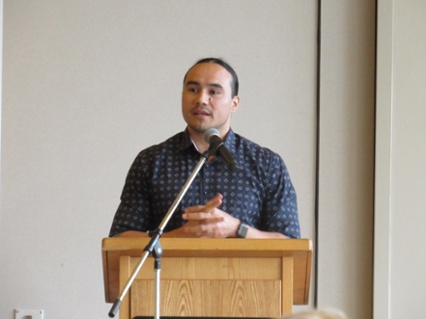 |
 |
|
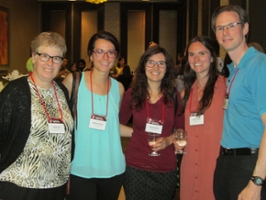 |
 |
V&A 2016 Speakers
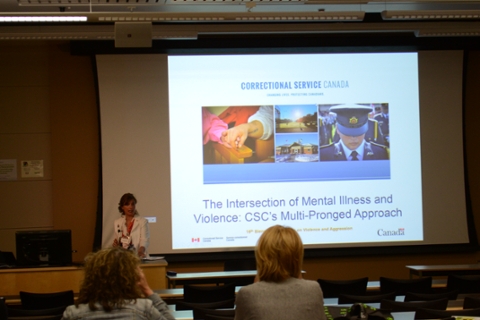 |
 |
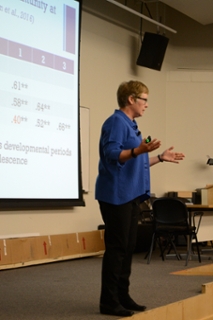 |
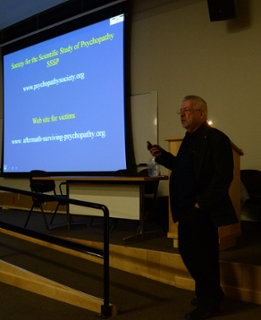 |
 |
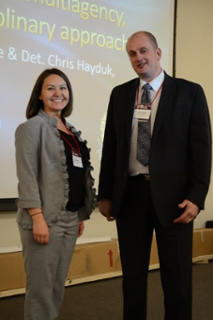 |
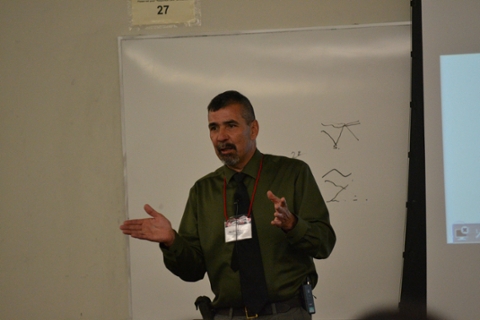 |
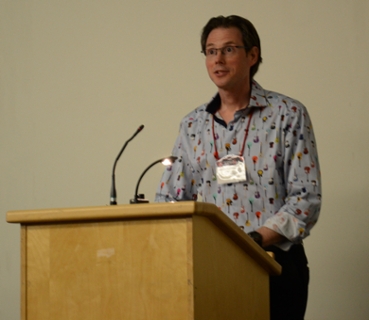 |
 |
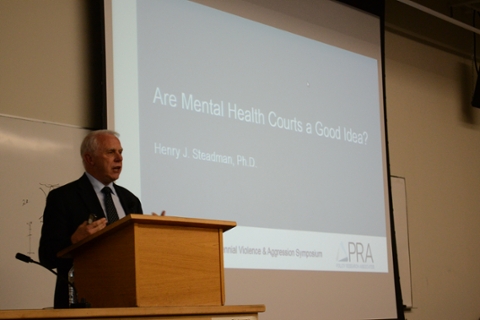 |
Book Signing
Dr. Robert Hare and Sgt. (Ret.) Ernie Louttit
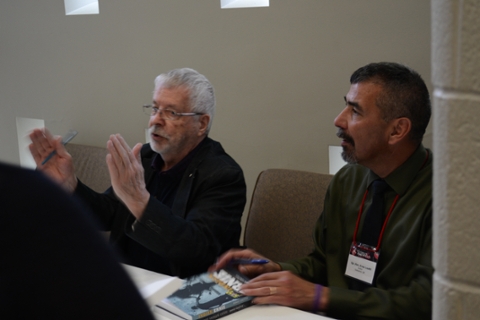 |
 |
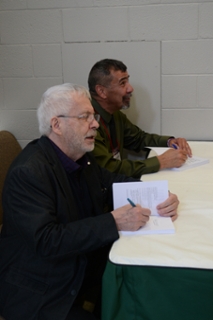 |
V&A 2016 Chair, Dr. J. S. Wormith
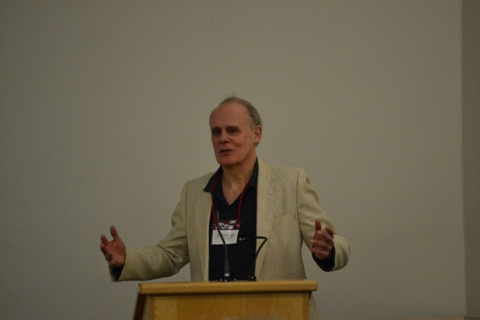 |
 |
V&A 2016 Posters
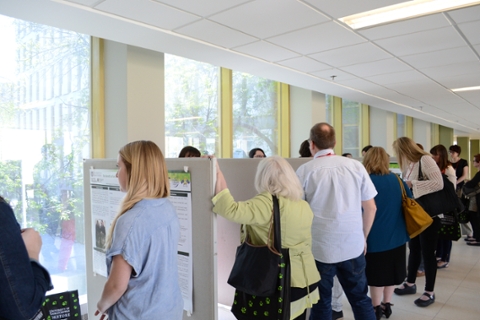 |
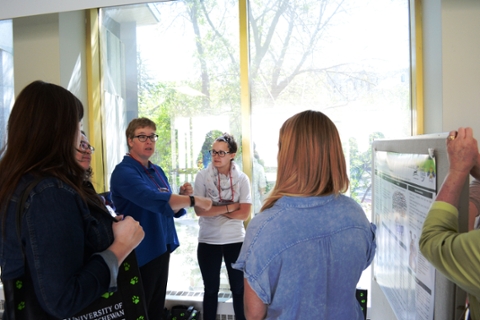 |
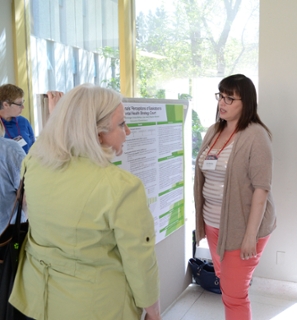 |
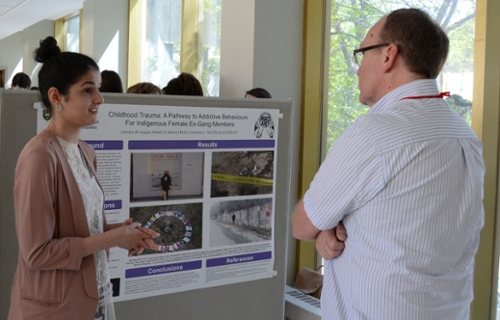 |
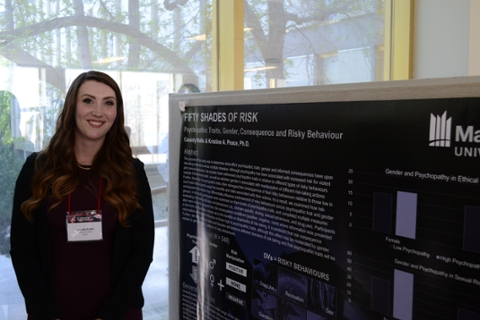 |
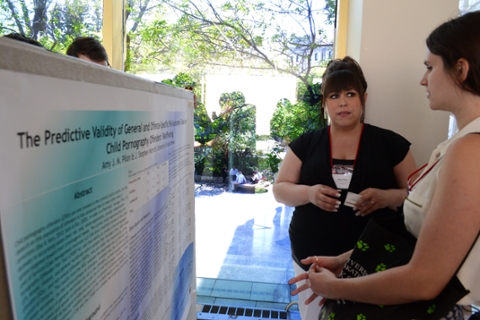 |
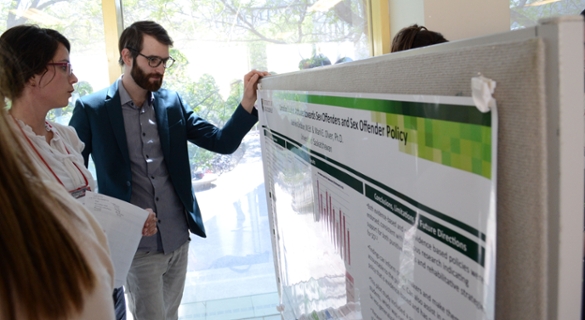 |
 |
 |
Booksale
 |

